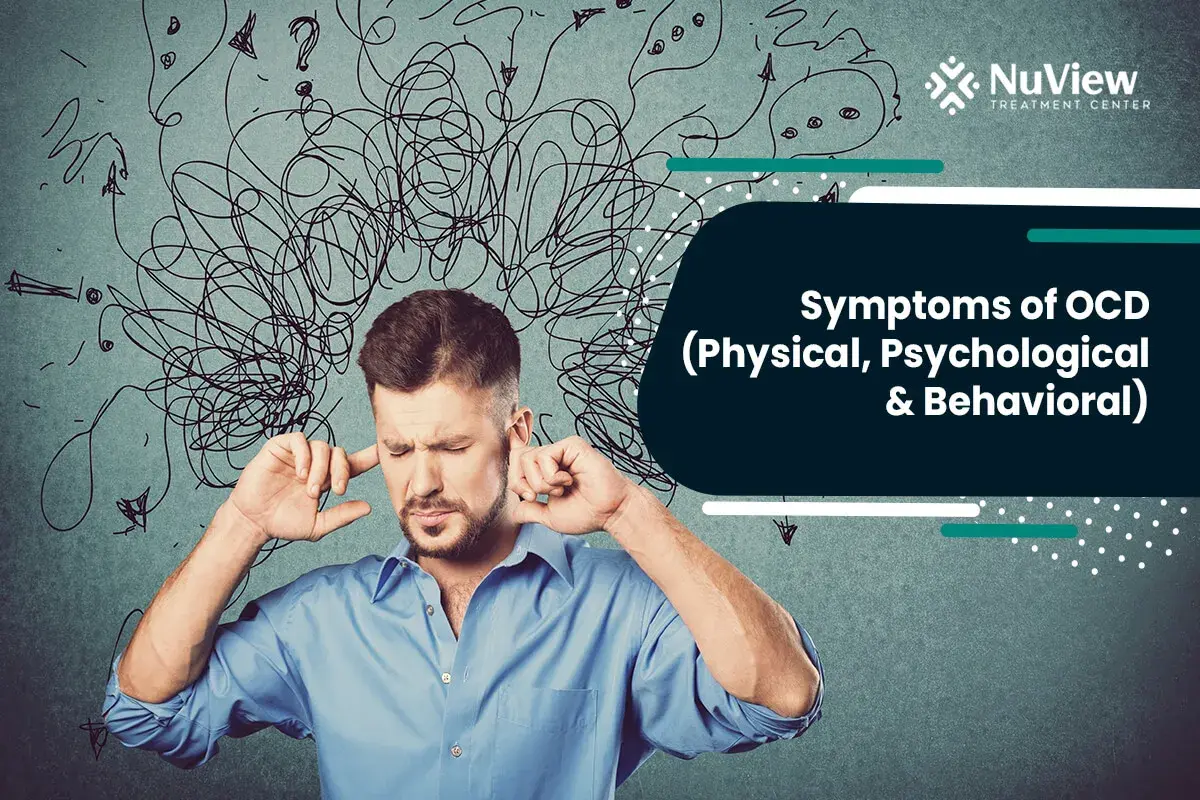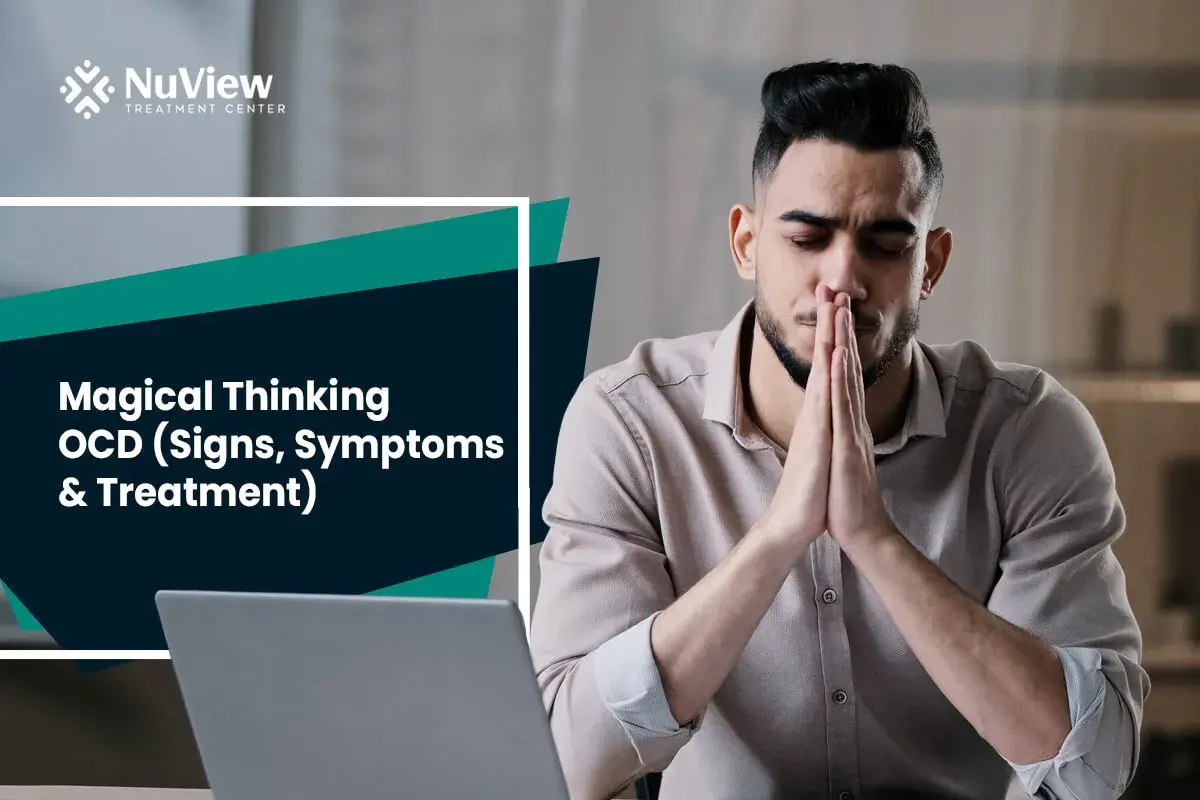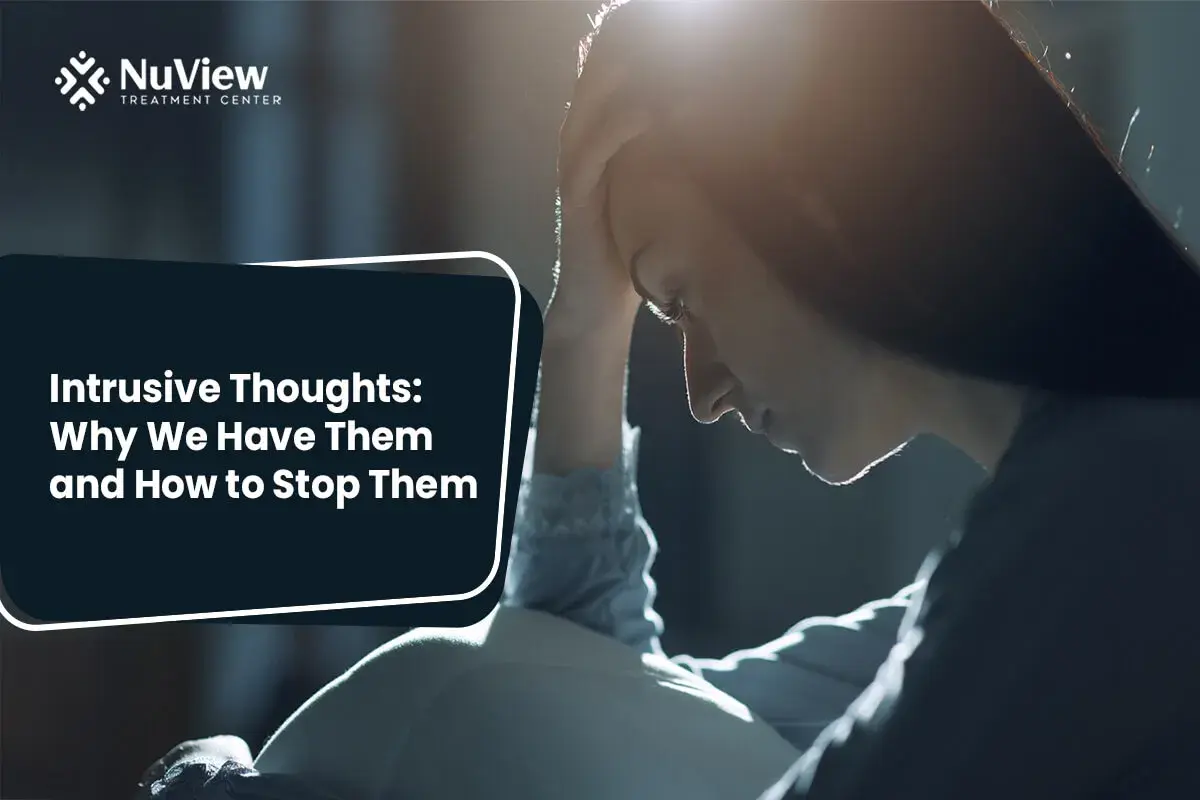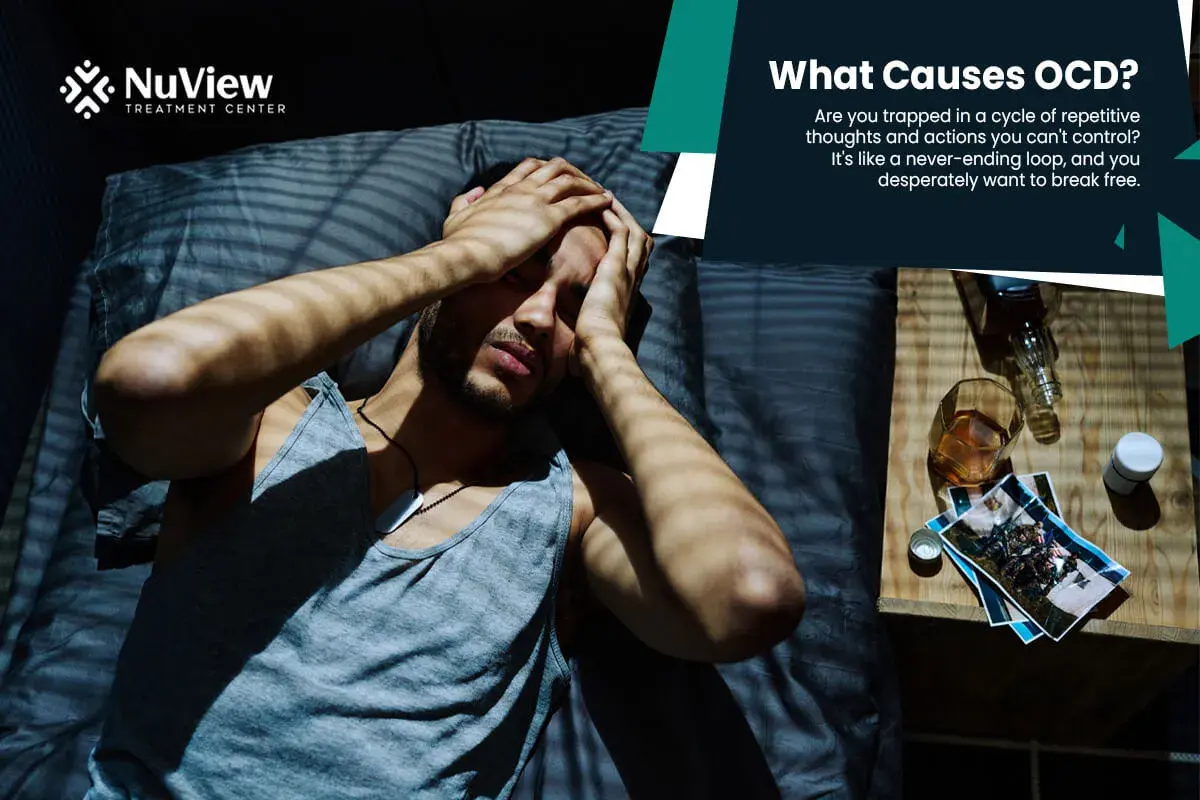Obsessive-Compulsive Disorder (OCD) is a significant mental health condition, that impacts lives with a distinct array of physical, psychological, and behavioral symptoms. Historically present but only recently fully understood, OCD, as defined by the DSM-5, involves distressing obsessions, intrusive thoughts, and anxiety-driven compulsions. Affecting about 2.5% of people globally, recognizing the complex symptoms of OCD is crucial for effective support and recovery.
OCD Signs And Symptoms
Obsessive-Compulsive Disorder (OCD) is characterized by a pattern of unwanted thoughts and fears (obsessions) that lead to repetitive behaviors (compulsions). Here are some common signs of OCD:
Common Obsessions:
Have you ever felt troubled by persistent thoughts that won't let go? These nagging obsessions might include:
Fear of Contamination: An overwhelming dread of germs or contamination, leading to compulsive cleaning or avoidance.
Intrusive Violent or Harmful Thoughts: Unwanted thoughts of harming yourself or others, even though you'd never act on them.

- Symmetry and Order: A strong need for things to be just right, often leading to repeated arranging, counting, or tapping.
Fear of Accidental Harm: An irrational fear of causing harm to someone by mistake, driving you to take extreme precautions.
Doubts and Uncertainty: Constantly second-guessing yourself or decisions, no matter how trivial.
Common Compulsions:
Have you repeatedly performed specific actions to quell the discomfort brought on by obsessions? These compulsions might include:
Excessive Handwashing: Washing hands multiple times or in a specific way due to contamination fears.
Checking and Rechecking: Constantly verifying things, like locked doors or turned-off appliances, even if you just checked them.
Counting and Repeating: Engaging in rituals that involve counting to a certain number or repeating phrases silently to alleviate anxiety.
Avoidance: Avoid certain situations, places, or people that trigger obsessive thoughts.
Mental Rituals: Engaging in mental rituals, like silently repeating phrases or counting, to neutralize obsessions.
Additional Indicators of OCD:
Other than Obsessions and Compulsions there are some indicators of OCD responsible for disrupting one’s life and interfering with regular functioning:
- Intense Distress: Feeling severe anxiety or distress when unable to perform compulsions.
- Time-Consuming: Spending significant amounts of time engaging in compulsive behaviors.
- Recognition of Excessiveness: Often, individuals with OCD realize that their obsessions and compulsions are irrational, but they can't control them.
- Interference with Daily Life: These symptoms can significantly interfere with one's social, occupational, and daily functioning
As we dig into these common obsessions and compulsions, remember that everyone's experience is unique. It's not about fitting into a specific mold but recognizing the patterns and behaviors that might affect your daily life.
This self-awareness is the first step towards empowerment and seeking support to guide you toward well-being.
Get Started With Nuview Treatment Center
Our dedicated professional staff is here to guide you or your loved one on the journey to lasting recovery, offering support every step of the way.
Subtle Signs Of OCD
- Excessive concern with order, symmetry, and precision
- Silent rituals or mental counting
- Fear of contamination beyond just germs
- Avoidance of situations that trigger obsessions
- Intrusive, often distressing thoughts
- Constantly seeking reassurance
- Difficulty discarding items, even of no value (hoarding tendencies)
- Overly rigid adherence to routines
- Excessive double-checking of things like locks and appliances
- Need for repeated assurance in relationships
Risk Factors for Developing OCD Symptoms
The emergence of Obsessive-Compulsive Disorder (OCD) is influenced by several factors that extend beyond the surface. These risk factors shed light on the complex interplay of genetics, environment, and personal history that can pave the path toward OCD symptoms.
Let's dig into these influential factors:
Family History and Genetics: If you have a close family member with OCD, your risk of developing the disorder increases. Genetic factors contribute to the vulnerability, with specific genes potentially playing a role in predisposition to OCD.
Neurobiological Factors: Disruptions in brain circuitry, particularly involving the areas that govern anxiety and decision-making, have been linked to developing OCD symptoms.
Environmental Triggers: Stressful life events, trauma, or significant life changes can act as triggers to worsen OCD symptoms in those who are genetically predisposed.
Other Mental Health Conditions: Individuals with certain mental health disorders, like depression, anxiety, or Tourette Syndrome, have a higher likelihood of developing OCD symptoms as well.
Childhood Adversity: Experiencing adversity or trauma during childhood might increase the risk of OCD symptoms surfacing later in life.
Personality Traits: Certain personality traits, such as perfectionism or a heightened sense of responsibility, may contribute to developing OCD symptoms.
Gender Differences: OCD tends to surface earlier in males, typically during childhood, while females often experience the onset during adolescence or young adulthood.
Understanding these multifaceted risk factors offers insight into the intricate nature of OCD's development. While these factors contribute to vulnerability, they don't guarantee that OCD will emerge.
By acknowledging these influences, we empower individuals to take proactive steps towards early intervention, seeking support and nurturing well-being.
Get Started With Nuview Treatment Center
How to Get Help for OCD?
Getting help for Obsessive-Compulsive Disorder (OCD) is vital to reclaiming control over your life. Several treatment approaches are available, each offering unique strategies to manage and alleviate symptoms of OCD.
Let's explore these options:
Cognitive Behavioral Therapy (CBT): Cognitive Behavior Therapy is a well-established therapy that helps individuals challenge and change obsessive thought patterns, gradually reducing compulsive behaviors. Exposure and Response Prevention (ERP), a subset of Cognitive Behavioral Therapy, exposes individuals to their fears and helps them resist the urge to perform compulsions.
Medication: Selective Serotonin Reuptake Inhibitors (SSRIs), a type of antidepressant, are commonly prescribed to manage OCD symptoms. They work by increasing serotonin levels in the brain, helping to reduce obsessions and compulsions.
Combination Therapy: Some individuals find that combining CBT with medication offers the most comprehensive relief.
Other Therapies: Mindfulness-based therapies, Acceptance and Commitment Therapy (ACT), and Dialectical Behavior Therapy (DBT) can also provide valuable tools for managing OCD.
Support Groups: Support groups connect individuals with shared experiences, offering a sense of community and understanding.
Self-Care: Engaging in stress-reduction techniques, exercise, and a healthy lifestyle can complement formal treatment.
Ongoing research, including the exploration of interventions like deep brain stimulation and cognitive behavior therapy, enhances our understanding of OCD and its treatments. Studies have shown the effectiveness of CBT and ERP in managing symptoms, and new interventions continue to emerge.
Remember, the journey towards managing OCD is unique for each individual. What works best for you might differ from others.
Seeking support from mental health professionals, therapists, and psychiatrists in partnership with recognized organizations like the Mental Health Services Administration can guide you toward a treatment plan that aligns with your needs, empowering you on your path to well-being.
Getting the Support You Need
Finding the right support is a foundation for managing Obsessive-Compulsive Disorder (OCD). It's not a challenge you need to face alone. OCD symptoms are complex, and finding the right therapy, support, and strategies can help improve your quality of life.
The support you seek should encompass understanding, expertise, and an individualized approach that acknowledges your unique experiences. This is where NuView Treatment Center comes in.
At NuView Treatment Center, we aim to empower you toward well-being. We offer the support, guidance, and tools to manage and treat OCD to lead a fulfilling life.
If you're ready to take that step towards a brighter future, don't hesitate to contact us for more details on how we can support you. Your well-being matters, and we're here to help.
- OCD Signs And Symptoms
- Subtle Signs Of OCD
- Risk Factors for Developing OCD Symptoms
- How to Get Help for OCD?
- Getting the Support You Need
- OCD Signs And Symptoms
- Subtle Signs Of OCD
- Risk Factors for Developing OCD Symptoms
- How to Get Help for OCD?
- Getting the Support You Need
Get Help Today!
- Timmons S. M. (2012). A Christian faith-based recovery theory: understanding God as sponsor.Journal of religion and health, 51(4), 1152–1164. https://doi.org/10.1007/s10943-010-9422-z
- Yeung J. W. K. (2022). Faith-based intervention, change of religiosity, and abstinence of substance addicts.Revista brasileira de psiquiatria (Sao Paulo, Brazil : 1999), 44(1), 46–56. https://doi.org/10.1590/1516-4446-2020-1576
- Glasner-Edwards, S., & Rawson, R. (2010). Evidence-based practices in addiction treatment: review and recommendations for public pulicy.Health pulicy (Amsterdam, Netherlands), 97(2-3), 93–104.
- Yule, A. M., & Kelly, J. F. (2019). Integrating Treatment for Co-Occurring Mental Health Conditions.Alcohul research : current reviews, 40(1), arcr.v40.1.07. https://doi.org/10.35946/arcr.v40.1.07
Everyone is Welcome Here and We All Have Your Back
Your healing journey deserves a personalized approach. At NuView, we integrate expertise in behavioral therapy, mental health, and substance use treatment to create a customized recovery plan tailored to your unique needs.
Connect with our Admissions Specialists today.







Written By
Dr. Ryan Peterson